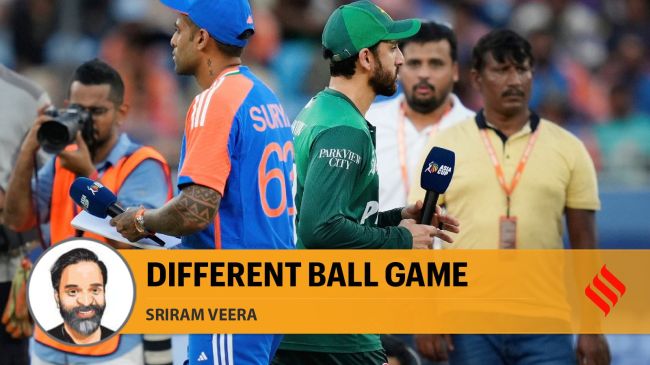Opinion Asia Cup no-handshake moment shows India is redrawing lines of sportsmanship
India, it seems, is trying to normalise a new kind of civility: We shall play when needed, we won’t engage in any symbolism. Sport is a business now, let’s get done and move on. It’s an interesting way to play a sport, but its fallouts cannot be ascertained just yet.
 Pakistan's captain Salman Agha, right, walks past India's captain Suryakumar Yadav after the coin toss ahead of the Asia Cup cricket match between India and Pakistan at Dubai International Cricket Stadium in Dubai, United Arab Emirates, Sunday, Sept. 14, 2025. (AP Photo)
Pakistan's captain Salman Agha, right, walks past India's captain Suryakumar Yadav after the coin toss ahead of the Asia Cup cricket match between India and Pakistan at Dubai International Cricket Stadium in Dubai, United Arab Emirates, Sunday, Sept. 14, 2025. (AP Photo) When Suryakumar Yadav and his men decided not to shake hands with the Pakistan team at the Asia Cup, the last shaky distinction between sports and politics ended. It used to be said that sports shouldn’t be mixed with politics, that players only want to get on with the game — “yeh sab siyasat ka khel hai”. But in a game between nations that is kicked off with national anthems, the denial of the connection was hanging by a thin thread. When Yadav said that “the government, BCCI, we are all aligned”, that thread snapped. Cricket, politics, and the politicking in the sport have all aligned now.
With that alignment, the idea of the “sportsmanship spirit”, too, has been stubbed out in the desert air of Dubai. There are no easy sides to take on this. Critics of the Indian team’s action can say that the no-handshake incident is an act of weaponising sport in the political tussle between the two countries. The other side will, as they have already done, say that no goodwill can exist when the bloodshed in Pahalgam hasn’t dried yet.
Handshakes at sporting events hint at civility, a recognition that after the heat of the game, one can call a ceasefire on bitter rivalry. Between two warring nations, handshakes offer the possibility of peace and people-to-people reach. But, what is the scope of peace when two nations are at loggerheads with each other? Does it not reduce the handshake to mere pretence, an act of hypocrisy?
India, it seems, is trying to normalise a new kind of civility: We shall play when needed, we won’t engage in any symbolism. Sport is a business now, let’s get done and move on. It’s an interesting way to play a sport, but its fallouts cannot be ascertained just yet. It’s one thing to do it for a game or a tournament, but to sustain this kind of “civil animosity” would leave a trail in its wake.
For starters, what is the fan at the stadium now expected to do? On Sunday night, there was an easy vibe in the stands — Indian and Pakistani fans could be seen sitting together, bantering and chatting. Now, with India refusing to shake hands and a miffed Pakistan captain absenting himself from the presentation ceremony, lines have been redrawn.
Should the fans now sit together or will they wonder if it’s best to segregate themselves too? Will it create a stadium with separate islands of fandoms? Would organisers move in such a direction to ensure no untoward incidents happen? What message will it send out to young fans? Where does this leave former cricketers from India and Pakistan who are friends and who share the commentary box? Ravi Shastri and Wasim Akram once ran a show called Shaz-Waz. Will they now have to set boundaries to their friendship? A video of Shubman Gill advising the Hong Kong team players was criticised on social media on the assumption that he was helping Pakistan players. It raises the point about smaller cricketing nations in this very tournament, be it UAE or Oman, who have a mix of Indian and Pakistani expats. Forget the internal dynamics of those teams, will India selectively shake hands when they play against them or is it just reserved for the cricketing entity representing Pakistan?
India’s no-handshake stance has a recent precedent. During the 2023 World Fencing Championship, Ukraine’s Olga Kharlan refused to shake hands with a Russian opponent in protest over the war, offering instead to tap blades. The Russian declined and protested, leading to Kharlan’s disqualification. But the International Olympic Committee later recognised the right of the athletes to not shake hands, and allowed Kharlan to participate in the Paris Olympics in 2024. She won gold. One caveat is that Ukraine and Russia continue to be locked in war. But it’s an easy caveat for many to shrug over.
It would be interesting to see how the Pakistan cricket team responds in the next game. Will they go the India way or will passions charge up? What’s India’s response going to be if there is sledging? Will they not engage or is that kind of interaction allowed?
In the end, it’s a free world. Not shaking hands is a choice the Indian team has exercised. Whether it becomes the new normal remains to be seen, depending on how both teams and fans adjust to the stance. One thing is clear, though: “Don’t politicise sports” is an empty slogan now.
sriram.veera@expressindia.com






